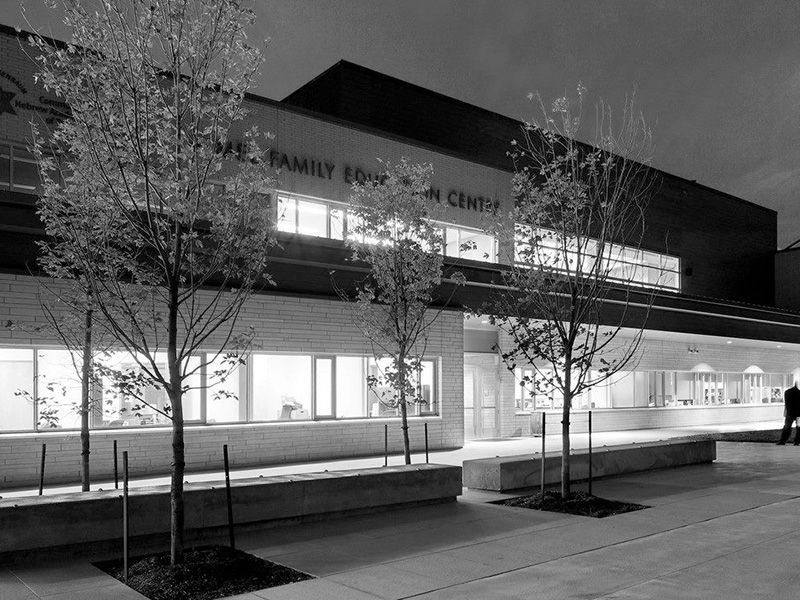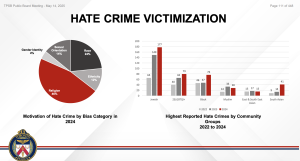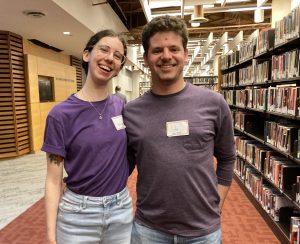An emotional and raucous three-hour town hall meeting about the closing of the northern campus of the Anne and Max Tanenbaum Community Hebrew Academy of Toronto left parents, teachers and students fuming at the school’s board of directors and administration.
About 500 people packed the gym at TanenbaumCHAT’s Kimel Family Education Centre (TCK) in Vaughan March 14 and castigated the board for keeping them in the dark about the difficult situation the school was facing prior to the closure being announced.
Many also left feeling the board didn’t adequately answer their questions about the closure and plan to merge the two campuses.
“It was a travesty to call this meeting under the guise of exchanging information and then brush parents off,” parent Rebecca Ansel said as the meeting ended.
On March 6, TanenbaumCHAT’s board of directors announced it would close the northern campus, which has long struggled with declining enrolment, and move all students to the school’s southern campus beginning next fall.
READ: MUSINGS ON A SHUTTERED JEWISH HIGH SCHOOL
At the same time, UJA Federation of Greater Toronto unveiled $15 million in donations that it said will allow the school to slash tuition by one-third, to $18,500 next year and $19,000 for the following four years.
Board treasurer Stephen Bloom, who chaired a lengthy question-and-answer session, made it clear the board’s decision would not change.
“We’re not here to assess proposals. The decision to close the campus has been made,” he said as the audience loudly voiced its displeasure.
“When you made the decision that because of financial viability, one campus was going to have to close, that was the time to put the message out,” Ruth Gottfried, a grandparent of a student at the school, said later in the session. “People are angry, not necessarily about what you did, but the way you did it.
“It also scares me a little that your plan for the future involves things that you have done in the past that have failed. You’re planning on raising more money, you’re planning on recruiting more students through the feeder schools and you’ve acknowledged that hasn’t worked. Is the entire school system going to fail in five years?”
Rabbi Lee Buckman, TanenbaumCHAT’s head of the school, and Ray Rubin, president of the board of directors, explained that while enrolment figures have been declining for a number of years at the northern branch, the board had hoped that a financial crisis could be averted by renting part of the school’s building to Leo Baeck Day School, a plan that was announced in November.
But by January, the school realized its enrolment projections were off by 30 per cent, while their fundraising projections had missed their goal by 45 per cent, Rubin said.
Tuition, which is currently $27,000, would have needed to increase to $30,000 in order to keep a second campus open, she said.
The $15 million in new donations require TanenbaumCHAT to fundraise $1.5 million annually. Last year, the school raised $798,000, and in 2015 it raised $340,000, according to its annual financial reports.
It would cost an extra $3 million to keep a second campus open and another 200 students would need to enroll there, Rubin said. “We have no track record of raising that kind of money,” Rubin told the meeting.
Currently, the north campus has 381 students, while the south campus has 585. Next year’s combined enrolment is projected at 850 students on one campus.
Forecasts based on the number of students currently in Jewish elementary feeder schools show that in five years, the south campus’ enrolment would remain steady at around 530 students, while the north campus would have dropped to about 180 students.
Parents and students criticized the school for what they described as its weak efforts at recruiting students, especially so-called “New Stream” students – teens who aren’t currently in day school, but can begin Jewish studies in Grade 9.
The school was also faulted for failing to cut its expenses and trim its administrative payroll while enrolment was dropping.
Andrew Howard, a parent and a superintendent with the Toronto District School Board, said that in the public system, a principal and two vice-principals are able to run a school with 1,300 students.
“I look now and I see a principal of general studies, a principal of Jewish studies, two vice-principals, a head of school to run one school campus… You’re looking at a management team of 60 people,” he said.
Howard also took aim at what he characterized as the school’s excessive spending on professional development and trips to Israel and other destinations.
“Where are you cutting? All I see is spending,” he said as the crowd cheered loudly.
Teachers also charged that the board had negotiated with them in bad faith, knowing that a branch closing was coming, but not telling the teachers’ unions.
“Maybe we would have negotiated differently [in ongoing contract talks] if we knew teachers were losing their jobs,” Aviva Polonsky, head of the Federation of Teachers in Hebrew Schools, said after the meeting.
The union is considering whether to lodge a complaint with the Ontario Labour Relations Board, she said.
Individual teachers will learn April 1 whether they will have a job at the merged campus. Meanwhile, they have missed the deadline to apply for jobs with the York Region District School Board, Polonsky said.
“Is this an ethical thing to do? Is this a Jewish thing to do?” she said.
Many speakers said the decision to close the northern campus is being seen as UJA Federation turning its back on the Jewish community north of Steeles Avenue, which is growing rapidly, especially at its northern edges, where housing prices are somewhat lower.
Alisa Daly, the mother of an elementary-school age child, told the board she runs a preschool, with 69 Jewish families currently enrolled, just blocks from the northern campus.
“It broke my heart that I was going to protest [tonight],” she said. “Please don’t close the door and give up on York Region.”
While the merger plan envisions that the majority of students from the northern campus will transfer to the southern one, a number of students said the distance is just too great, especially since they would be travelling during rush hour as part of the crush of commuter traffic.
READ: TORONTO MAYOR ATTENDS STUDENT-ORGANIZED RALLY AGAINST ANTI-SEMITISM
Adam Livshits, a Grade 10 student who lives near Yonge Street and Elgin Mills Road, said it would take him an hour and a half to reach the southern campus. His family has asked for its enrolment deposit back, and he will attend public high school next year, he said.
Other parents, especially those living north of the Vaughan campus, said the lengthy commute combined with the longer school day and demanding curriculum will add to students’ stress.
“My daughter comes home and works for 2-1/2 hours,” said Howard. “What’s going to happen when she comes home at 6 p.m.?”
A group of parents who are concerned that, among other problems, the deadline to merge the campuses is too tight proposed that the decision be delayed at least one year. During that time, the group says it hopes to launch an “aggressive campaign” to raise funds and increase enrolment by promoting the new lower tuition fees.
At the same time, a transition plan to merge the two campuses, if necessary, could be devised to ensure “the transition is well thought out… and will not negatively impact the level of education currently being received,” according to a post on the group’s Facebook page, Save TCK.
The parents will present their proposal to the board the week of March 20.







